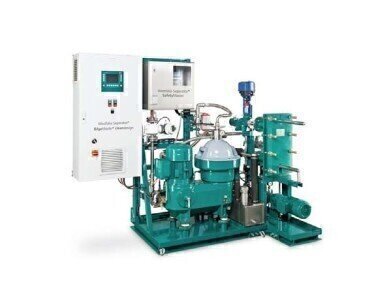Water/Wastewater
Centrifugal Bilgewater Processing
Nov 14 2013
Oil is the principal source of energy and therefore the most important resource in modern civilisation. However, oil is toxic for most biological systems and considered to be one of the greatest environmental pollutants. Pollution by crude oil or petroleum products has far-reaching effects. According to estimates of the UNEP (United Nations Environment Programme), around 120,000 tonnes of oil find their way into the Mediterranean Sea each year, for example from the Mediterranean traffic of around 200,000 ships per year; Greenpeace scientists even consider a volume of 635,000 tonnes to be realistic.
The processing of bilgewater, which collects in the engine room of a ship and is contaminated with oil and fuel residues, is therefore required by law for all ships. There is also already discussion of intensification of the IMO (International Maritime Organisation) regulations, for example with an international ruling to generally reduce the allowable oil content in bilgewater pumped overboard from 15 ppm to 5 ppm. For the manufacturers of bilgewater processing systems, this means that there is increasingly frequent demand for systems with residual oil content below 5 ppm.
In the context of the system “GEA Westfalia Separator seaprotectsolutions – Clear Waters to the Horizon and Beyond”, GEA Westfalia Separator Group has developed technologies of the future, looking well beyond the horizon, so the ships can be operated economically and direct protection for the sea can be guaranteed. In bilgewater treatment as part of seaprotectsolutions, the new developments enable the GEA Westfalia Separator BilgeMaster cleandesign not only to achieve a value below 15 ppm oil in water as with the tried and tested BilgeMaster but even to guarantee below 5 ppm – with no use of chemicals and no filters. The objective in the development of the GEA Westfalia Separator BilgeMaster clean design was to create a system that guarantees residual oil content below 15 ppm under normal conditions and below 5 ppm in special areas. Without the use of chemicals and filters, this is guaranteed by means of adaptive capacity and temperature alignment during processing. At 5 ppm, the system therefore works with reduced output. If the output at 5 ppm is to remain as high as at 15 ppm then a connected adsorption filter achieves this value.
With the launch of the new generation of self-cleaning separators, the GEA Westfalia Separator eagleclass series, four systems are now offered as the BilgeMaster cleandesign based on separators WSE 5, 10, 20 and 50 with outputs of 500, 1,200, 2,500 and 5,000 l/h. Retrofitting of the GEA Westfalia Separator BilgeMaster D and E series with cleandesign can also be completed at any time, as can retrofitting of an adsorption filter. GEA Westfalia Separator seaprotectsolutions ensure clear water.
Events
Aug 24 2025 Stockholm, Sweden and online
Aug 27 2025 Busan, South Korea
Sep 02 2025 Mexico City, Mexico
Sep 02 2025 Mexico City, Mexico
Sep 09 2025 Moscow, Russia





.jpg)








